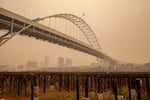Oregon is considering ways to protect workers required to labor in extreme weather conditions, which are becoming more common in this age of climate change.
The Oregon Occupational Safety and Health Administration, or Oregon OSHA, has started the rulemaking process to protect workers whose jobs keep them outside of climate-controlled settings during conditions of wildfire smoke or excessive heat. That includes farmworkers, public transit drivers, delivery drivers and warehouse employees. The rulemaking is part of Gov. Kate Brown’s proposal directing agencies like Oregon OSHA and the Oregon Health Authority to develop policies to protect workers from exposures like these.

Smoke obscures the hills and buildings normally visible in downtown, Portland, OR. The air quality in the city has been ranked as the worst of all major cities in the world due to smoke blowing in from several surrounding wildfires. Sept. 10, 2020.
Claudia Meza / OPB
The rule proposal serves as an acknowledgment that summer heatwaves and smoke incursions from wildfires are here to stay, thanks to the way burning fossil fuels is contributing to global warming.
This year, the state is already experiencing warmer temperatures and minimal rain. Some fear it could potentially cause the worst drought in decades and could lead to higher risks of wildfires.
The farmworkers union Pineros Y Campesinos Unidos del Noroeste, known as PCUN, has been advocating for protections like these. Ira Cuello-Martinez, PCUN’s climate policy associate, said he’s working with a number of other environmental organizations and worker’s rights groups to make sure the agencies are speaking with workers that are directly affected and make sure they have a seat at the table.
“We (PCUN) focus on farmworkers but it affected a multitude of industries in a variety of ways,” he said. “So, we are continuing to engage with this coalition of advocates to really push back against any exemptions or leniency or just trying to have not as strong rules to protect workers.”
He said with rising temperatures and red flag warnings already issued this year, many workers continue to work in these conditions out of necessity. Despite the discomfort and health risks, many cannot afford to miss a day of work.
“These things are going to be ongoing issues that are going to be becoming more relevant during our lifetimes as a result of the increase in global temperature, the increase in droughts, how long droughts are lasting,” he said.
Exposure to excessive heat can lead to heat-related stresses like confusion, slurred speech, seizures, and loss of consciousness. Wildfire smoke contains a mixture of gasses and from burning buildings, other materials, and forests. Wildfire smoke particles, or PM 2.5, are thirty times smaller than human hair and if inhaled can cause serious health impacts for people with preexisting health conditions like asthma and heart disease.
Oregon OSHA and OHA are using tools like the Air Quality Index monitors, which categorizes air quality into six levels. Last year, the air quality was so hazardous during the September wildfires, it was recording off-the-charts numbers west of the Cascades.
The Oregon Environmental Council is another advocacy group pushing for the rules. Climate Program Director Nora Apter is looking for more transparency as the process moves along to make sure workers’ health is a priority.
“Right now, frontline workers have no assurance that, in the face of climate hazards like wildfire smoke and excessive heat, that their health and well-being will be prioritized over industry bottom lines,” she said. “There is no assurance of that.”
Oregon OSHA is looking into California and Washington rules and how they can adapt some of those in Oregon.
Kate Suisman, an attorney with the Northwest Workers Justice Project, said the coalition of advocates is also pushing for preventative pay.
“It’s not an unknown idea. There’s a standard in California, the lead standard, has that income replacement if the workers can’t work, if they’re too sick to work because of lead,” she said.
The Oregon Farm Bureau represents a number of growers in the Willamette Valley, where such added worker protections would play out. The bureau’s Public Policy Counsel Samantha Bayer said farmers need guidance and direction from the state during extreme weather events. She said last September’s wildfires happened during a critical part of the harvest, adding to farmers’ stress.
“A lot of our members were not prepared on what do you do when you have days and days of smoke in the air,” Bayer said.
Farmers need the rules to strike a reasonable balance, she said. The agency needs to give agricultural employers the guidance they need to protect workers from extreme and unhealthy conditions, but without leaving unharvested crops to perish, potentially bankrupting growers.
“No one … is saying we don’t need these rules. That’s never come up, ever, that has not been the case,” she said. “It’s been, what should the rules be and ... what should those rules actually entail?”
Oregon OSHA will hold two listening sessions for workers to share their thoughts and experience with excessive heat and wildfire smoke on May 20 and May 25. The agency says it plans to have Spanish language interpreters available.
The agency says it does not anticipate adopting these rules before this year’s wildfire season begins but could potentially adopt rules if they are further along by then.
